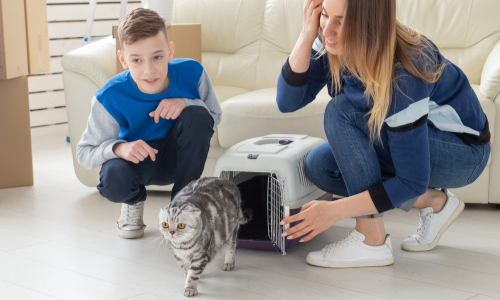
Getting Your New Cat Accustomed to Your Home
Will you be adding a cat or kitten to your household soon? Adjusting to a new home can be a little overwhelming for your pet. Following these tips may make the adjustment process much easier.
Create a Safe Haven for Your Pet
You'd probably feel a little nervous if you suddenly found yourself living in an unfamiliar home with people you'd just met. Your cat or kitten may feel the same way.
Help your cat adapt to its new surroundings by placing it in a quiet room for the first few days. Add a litter box, a few toys, food, and water to the room. (Place the litter box at the opposite end of the room from the food and water dishes.)
Spending time in one room will give your pet time to adjust to the sounds and smells of your home. Pay occasional visits to the room but don't force your pet to interact with you. Some cats and kittens may feel more comfortable hiding under a piece of furniture during visits from new family members at first. As your cat or kitten grows accustomed to you, it will soon venture out from its hiding place.
Gradually Introduce Your Cat to Your Other Pets
Confining your pet to one room initially may also make it easier for your new and older pets to get to know each other from a distance. The addition of a new cat may make other animals feel territorial, which can spark fights. Separating your new addition prevents territory issues while allowing your other pets to gradually become accustomed to each other.
The Humane Society of the United States suggests feeding your new pet and your old pets on either side of the door to help both pets adjust to new smells. You can also rub a towel over your new pet, then let your other pets sniff it.
When you finally introduce your pets, be prepared to separate them if either of them appears agitated or aggressive. Make the first getting-to-know-you session brief, then gradually extend the amount of time the pets spend together if everything goes well.
Make Play Part of the Adjustment Process
Play sessions may make it easier for timid cats to feel comfortable interacting with you or other family members. Toys also provide a distraction when you're introducing pets to each other and may help reduce aggression. Kitty fishing rods, laser pointers, and other toys give your pets something to do while they're in the same room. Make sure each pet has its own toy to avoid problems.
Teach Your Children How to Interact with Your Cat
Show young children how to touch your cat gently and recognize signs that your pet no longer welcomes the attention. (Tail swishing, hissing, or trying to get away are clear signs that the petting session is over.) Go over a few ground rules, such as no pulling the cat's tail or touching or picking up the pet while it's eating or sleeping.
If your child will be participating in the cat's care, keep in mind that it's ultimately your responsibility to make sure that the pet's needs are met. If your cat's water dish is empty or the litter box is overflowing, it's time for you to step in.
Give Your Pet a Tour
Once your cat has access to your entire home, show it where it can find the litter box and food and water dishes. If your new addition is a kitten or an elderly cat, it may be a good idea to place a litter box on every level of your home to prevent accidents.
Make Your Cat's Health a Priority
New cats or kittens should see the veterinarian within a week or two of their arrival at your home. Your veterinarian will look for signs of conditions or diseases that could affect your pet's health and recommend immunizations that will prevent serious illnesses, like rabies and feline distemper.
Have you recently added a new cat to your home? We can help you care for your furry friend's health. Contact us to schedule your new pet's first appointment.
Sources:
Humane Society of the United States: Introducing Your New Cat to Other Pets
